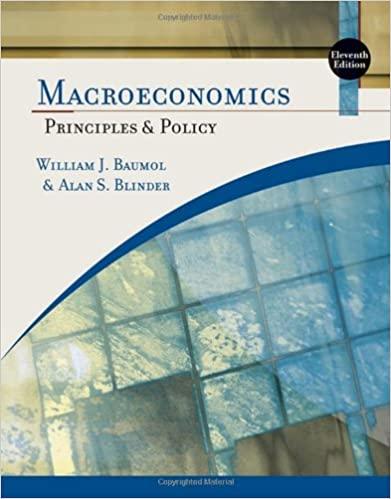Question
1. Hyperinflations are extremely rare in countries whose central banks are independent of the rest of the government. Why might this be so? 2. Let's
1. Hyperinflations are extremely rare in countries whose central banks are independent of the rest of the government. Why might this be so?
2. Let's consider the effects of inflation in an economy composed of only two people: Bob, a bean farmer, and Rita, a rice farmer. Bob and Rita both always consume equal amounts of rice and beans. In 2010, the price of beans was $1, and the price of rice was $3.
a. Suppose that in 2011 the price of beans was $2 and the price of rice was $6. What was inflation? Was Bob better off, worse off, or unaffected by the changes in prices? What about Rita?
b. Now suppose that in 2011 the price of beans was $2 and the price of rice was $4. What was inflation? Was Bob better off, worse off, or unaffected by the changes in prices? What about Rita?
c. Finally, suppose that in 2011 the price of beans was $2 and the price of rice was $1.50. What was inflation? Was Bob better off, worse off, or unaffected by the changes in prices? What about Rita?
d. What matters more to Bob and Ritathe overall inflation rate or the relative price of rice and beans?
Step by Step Solution
There are 3 Steps involved in it
Step: 1

Get Instant Access to Expert-Tailored Solutions
See step-by-step solutions with expert insights and AI powered tools for academic success
Step: 2

Step: 3

Ace Your Homework with AI
Get the answers you need in no time with our AI-driven, step-by-step assistance
Get Started


